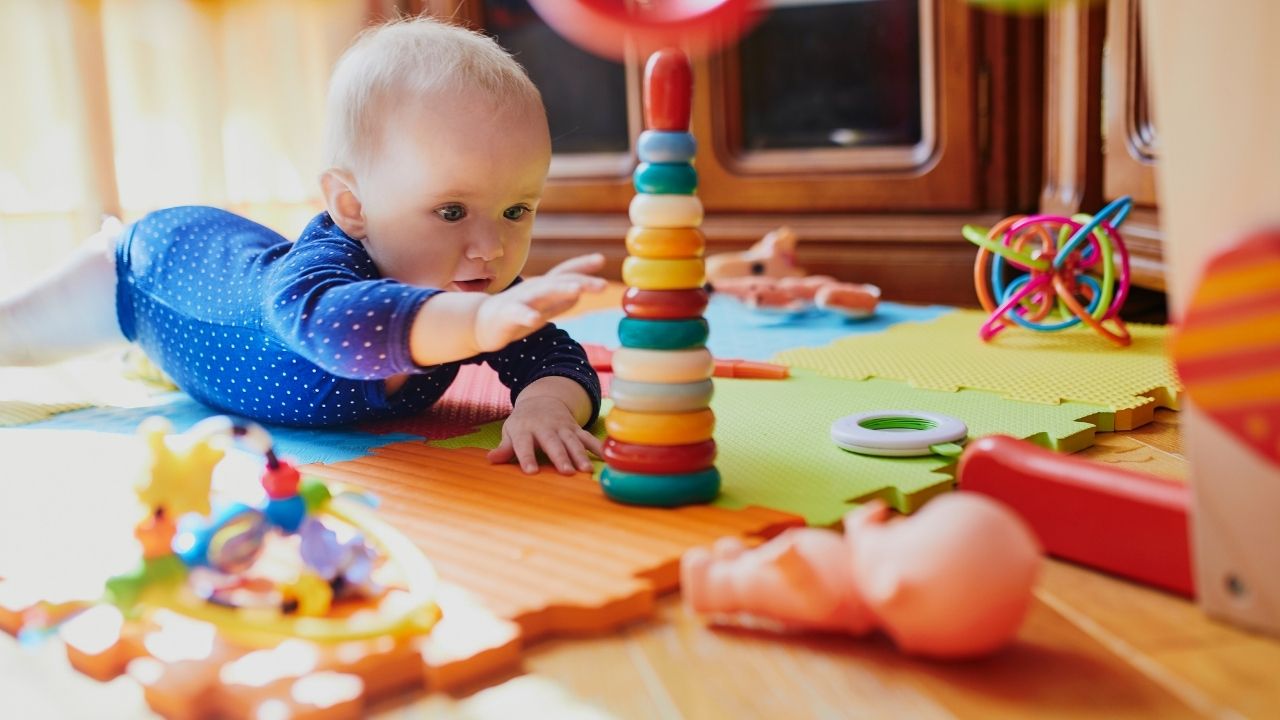Congratulations on becoming a parent! As you embark on this journey, one of your primary concerns will be the health and well-being of your baby. Raising a healthy child requires careful attention to their needs, from nutrition and sleep to vaccinations and developmental milestones. With so much information available, it can be overwhelming to know where to start.
That's why we've created this guide to help you navigate the world of baby health. We'll cover everything from breastfeeding and nutrition to soothing a fussy baby and when to call the doctor. Our goal is for you to feel confident in your ability to care for your little one and give them the best possible start in life. So let's get started!
Breastfeeding and Nutrition
In this section, we'll explore the best ways to feed and nourish your little one through breastfeeding and optimal nutrition. Breastfeeding is a crucial component of your baby's health, as it provides numerous benefits such as boosting immunity, promoting healthy weight gain, and reducing the risk of infections. It is also beneficial for mothers as it helps in bonding with the baby while lowering the chances of postpartum depression.
Aside from breastfeeding, it's important to pay attention to your baby's nutritional requirements. Newborns require frequent feeding sessions every 2-3 hours due to their small stomach capacity, but as they grow older, they will gradually need less frequent meals. Aim for nutrient-dense foods that provide essential vitamins and minerals for growth and development. As always, consult with your pediatrician to ensure you are meeting your baby's specific needs. With proper nourishment comes better health outcomes for your little one!

Transition: Now that we've discussed how to properly feed and nourish your newborn let's dive into another crucial aspect of raising a healthy baby - establishing good sleep habits and routines.
Sleep and Routine
You'll want to establish a consistent sleep schedule and routine for your little one to help them feel secure and well-rested. Bedtime rituals can help signal to your baby that it's time to wind down for the night. This could include a bath, storytime, or lullabies. It's important to find what works best for you and your baby.
Nap schedules are also crucial in ensuring that your little one gets enough rest during the day. As they grow, their nap needs will change, but having a general idea of when they need to nap can make all the difference. Keeping a consistent sleep schedule and routine not only benefits your baby's health but can also provide some structure in your own life as well. Now let's move on to the importance of vaccinations and immunizations for your baby's overall health and wellness.
Vaccinations and Immunizations
When it comes to vaccinations and immunizations for your baby, it is important to understand their significance in protecting against serious diseases. The Centers for Disease Control and Prevention (CDC) recommends a series of vaccines for babies starting at birth up until 18 months of age. While some parents may have concerns about vaccine safety, the CDC assures that extensive research has been done to ensure their effectiveness and minimal risk.

Importance of Vaccinations
Hey there, it's always amazing to see your little one grow up healthy and happy, and vaccinations are a crucial part of that journey. Here are three reasons why vaccines are important:
They protect your baby from serious illnesses: Vaccines work by stimulating the immune system to produce antibodies against specific diseases. When your baby receives a vaccine, their body learns how to fight off the disease if they encounter it in the future. This means that vaccinated babies are less likely to get sick from diseases like measles, polio, and whooping cough.
They contribute to herd immunity: Herd immunity occurs when enough people in a community are vaccinated against a disease, making it difficult for the disease to spread. This not only protects individuals who can't receive certain vaccines due to medical reasons but also helps prevent outbreaks of infectious diseases.
They combat vaccine hesitancy: Vaccine hesitancy is a growing concern among parents who may be unsure about the safety or efficacy of vaccines for their children. However, getting your baby vaccinated according to recommended schedules can help build trust in vaccines and reduce worries about their effectiveness.

As you can see, vaccinations play an essential role in keeping your baby healthy and safe from deadly illnesses. In the next section, we'll discuss some recommended vaccinations for babies so you can ensure that your little one gets all the protection they need.
Recommended Vaccinations for Babies
Get ready to arm your little one with the best protection possible as we explore the recommended vaccinations for your bundle of joy. Following a vaccine schedule is crucial in ensuring that your baby gets the necessary vaccines at the right time. Vaccines work by introducing a small, harmless piece of the virus or bacteria into your baby's body, which triggers their immune system to produce antibodies. These antibodies help fight off future infections caused by these viruses or bacteria.
It's important to note that while vaccines are generally safe and effective, they can cause side effects like redness and swelling at the injection site, fever, and fussiness. However, these side effects are usually mild and go away on their own within a few days. The benefits of getting vaccinated far outweigh any potential risks associated with them. So make sure to follow your doctor's recommended vaccine schedule to keep your little one protected from serious illnesses.
As you prepare for parenthood, it's essential to understand how vaccines work and why they're so important for your baby's health. In the next section, we'll delve deeper into vaccine safety and address some common concerns parents have about vaccinating their children.

Vaccine Safety
As a parent, you want to make sure that your baby is protected against harmful diseases. Vaccinations are an essential tool in preventing illnesses and promoting herd immunity. However, some parents may choose to opt-out of vaccinating their babies due to religious or personal beliefs. This decision could put not only their child but also other vulnerable children at risk. While vaccine exemptions are available in most states, it is important to consider the potential consequences before making this choice.
When it comes to vaccines, safety is a top concern for parents. It's understandable to be cautious about what goes into your baby's body, but rest assured that vaccines undergo rigorous testing and monitoring before they are approved for use. Here are four reasons why vaccines are safe:
- Vaccines go through multiple phases of clinical trials involving thousands of participants.
- The Centers for Disease Control and Prevention (CDC) continuously monitors vaccine safety and effectiveness.
- Serious side effects from vaccines are rare.
- The benefits of getting vaccinated far outweigh the risks.
By ensuring that your baby receives all recommended vaccinations on schedule, you can help protect them from serious illnesses and contribute to maintaining herd immunity within your community. But vaccination is just one aspect of raising a healthy baby - keep reading to learn about developmental milestones!
Developmental Milestones
You'll be amazed at the progress your little one will make as you track their developmental milestones. From learning to crawl and walk to mastering language development, there are so many exciting moments to look forward to. Crawling is a major milestone that typically happens between six and ten months old. At first, your baby may scoot or roll before finally figuring out how to move their arms and legs in a coordinated crawling motion.

As your baby grows, they'll begin developing their language skills by babbling, cooing, and eventually saying their first words. It's important to talk to your baby often and use simple words and phrases so they can start recognizing the sounds of language early on. By around 12 months old, most babies will have said their first word or two – an exciting moment for both parents and child! Keep track of these milestones as they happen so you can celebrate each accomplishment along the way.
As you watch your little one grow and develop, it's also important to know how to soothe them when they're fussy or upset. In the next section, we'll cover some tips for calming a crying baby and making sure they feel comfortable and safe in their new world.
Soothing a Fussy Baby
Soothing a fussy baby can feel like trying to calm a hurricane with just a blanket, but there are some helpful tips to make it easier. Here are some effective strategies that can help soothe your crying baby:
- Try baby massage: Gentle rubbing or massaging your baby's tummy or back can provide comfort and ease colic symptoms.
- Use white noise: Playing soft sounds such as raindrops, ocean waves, or lullabies might help soothe your little one and create a calming environment.
- Experiment with different holding positions: Some babies prefer being held in an upright position while others find comfort in being cradled.
As you try these techniques, remember that every baby is unique and what works for one might not work for another. If despite your best efforts, your baby continues to cry inconsolably, it may be time to consider other colic remedies or seek the advice of a healthcare professional. In the next section, we'll discuss when it's appropriate to call the doctor.

When to Call the Doctor
If your little one is showing signs of illness such as a fever or rash, it's important to call the doctor right away. Common illnesses like colds and ear infections can often be treated at home, but if your baby is experiencing symptoms like persistent vomiting or diarrhea, difficulty breathing, or a high fever that won't go down with medication, it's time to seek professional medical attention.
It's also important to note that if you ever feel unsure about your baby's health or have any concerns, don't hesitate to call the doctor. As a parent, you know your child best and are the first line of defense in protecting their well-being. Don't be afraid to ask questions and advocate for your baby's health – after all, they depend on you for everything!
Frequently Asked Questions
How much screen time is safe for a baby?
When it comes to screen time for your baby, the American Academy of Pediatrics recommends no screen time at all for children under 18 months old. After that age, limited screen time is okay, but interactive toys and outdoor activities should be prioritized. It's important to remember that excessive screen time can lead to a host of negative consequences, including delayed language development, sleep problems, and decreased physical activity. So while it may be tempting to let your little one watch TV or play with your phone for extended periods of time, it's best to limit their exposure and encourage other forms of play and exploration instead.
Can I use essential oils to calm my fussy baby?
If you're a new parent, it's natural to want to explore alternative calming techniques for your fussy baby. However, when it comes to essential oils, it's important to consider their safety before use. Some essential oils can be harmful or even toxic for babies, so always consult with a healthcare professional before using them. Instead of relying solely on essential oils, try alternative calming techniques such as swaddling, gentle rocking, or white noise machines. Remember that every baby is different and what works for one may not work for another. It's always best to prioritize your baby's safety and well-being above all else.

How can I prevent my baby from getting sick when traveling?
To prevent your baby from getting sick when traveling, it's important to consider travel vaccinations and the use of a baby carrier. Consult with your pediatrician about recommended vaccinations for your destination, as some countries may have higher risk of certain illnesses. Additionally, using a baby carrier can help protect your baby from germs in crowded areas such as airports or public transportation. It also allows for easier mobility while keeping your hands free to carry luggage or other items. By taking these precautions, you can help ensure a healthy and enjoyable trip for both you and your little one.
Should I be concerned if my baby is not crawling at a certain age?
If your baby is not crawling at a certain age, do not panic. Developmental milestones vary from child to child. Some babies skip crawling altogether and go straight to walking, while others may crawl later than their peers. However, if you are concerned about your baby's development, it is always best to consult with your pediatrician. Additionally, there are alternative mobility methods such as rolling or scooting that can still promote gross motor skills and prepare your baby for walking. Remember, every baby develops at their own pace and comparing them to others will only cause unnecessary stress. Focus on providing a safe and stimulating environment for your little one to explore and develop in their own time.
What are some ways to introduce solid foods to my baby?
Introducing solid foods to your baby can be a fun and exciting experience for both you and your little one. There are two main methods: puree introduction and baby led weaning. Purees involve blending fruits, vegetables, or meats into a smooth consistency that is easily consumed by your baby. Baby led weaning involves offering small pieces of soft food that your baby can pick up and eat on their own. Whichever method you choose, it's important to introduce one new food at a time to monitor for any potential allergies or reactions. Remember to always consult with your pediatrician before making any major changes in your baby's diet. As you navigate this new territory, enjoy the journey and have fun exploring new flavors and textures with your growing child!
Conclusion
Congratulations! You have just embarked on the exciting journey of raising a healthy baby. From breastfeeding and nutrition to vaccinations and developmental milestones, you now have a guide full of useful information at your fingertips.

As you navigate through this new world of parenthood, remember that it's okay to feel overwhelmed at times. Just like a ship sailing in uncharted waters, you may encounter rough patches along the way. However, with the right tools and knowledge in hand, you can steer your baby towards a bright and healthy future.
So set sail with confidence knowing that you are equipped with the necessary information to make informed decisions for your little one. Remember to enjoy every moment as they grow up fast – before you know it, they will be setting sail on their own journey.
.png)





